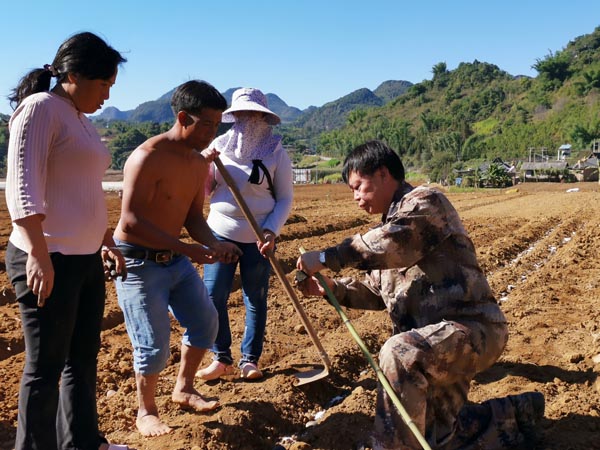Role model plant expert is a master in his field
China Daily,January 08, 2020 Adjust font size:

Zhu Youyong (right), an academician of the Chinese Academy of Engineering, works in a field to help villagers tackle poverty in Lancang Lahu autonomous county, Yunnan province. [Photo provided to China Daily]
Seeing Zhu Youyong work in the fields, in mud-spattered camouflage fatigues and carrying a hoe on his shoulder, you would never guess that he is a globally renowned plant pathologist in action.
"The worker" has been the honorary president of Yunnan Agricultural University since 2004, and an academician at the Chinese Academy of Engineering since 2011.
Despite countless awards and honors, at the age of 60, he decided to live among the villagers at the Lancang Lahu autonomous county in Yunnan province and help them tackle poverty using advances in agricultural technology.
Because of his contributions, Zhu was conferred the title "Role Model of the Times" on Dec 2 by the Publicity Department of the Communist Party of China Central Committee.
Zhu stresses repeatedly, and modestly, that despite the acclaim he is held in, he is simply a farm laborer: "After all, I am just a farmer who knows how to grow crops, so my research subjects are all based on the farmers' needs."
Observing from childhood that farmers worked very hard, but had to rely on sometimes unpredictable crops, Zhu enrolled at the Yunnan Agricultural University in 1977 and then went to the University of Sydney, to study rice blast, a devastating fungal disease.
Coming back to Yunnan province, he went on research trips to 62 counties and studied the gene resistance of more than 2,000 rice varieties, and finally made a breakthrough in using heterogeneity, or diversity, to combat rice blast.
His research resulted in Genetic Diversity and Disease Control in Rice and was published as a cover story on the journal Nature on Aug 17, 2000. Then in 2004, Zhu won first prize in the International Year of Rice Global Scientific Contest held by the United Nations Food and Agricultural Organization.
Academic achievements alone are not enough. Zhu wants to see his research results actually help farmers live a better life.
In 2015, the Chinese Academy of Engineering decided to help poverty-stricken Lancang county, and Zhu volunteered to take up the task.
When he first went to the county's Yunshan village during a field trip, he was appalled by the austere living conditions: "It is because we did not truly do something for the people. It is the negligence of an academician that people cannot benefit from our research results."
For the past four years, he has spent more than 100 days every year living and working in the mountains.
"Poverty alleviation is so much harder than publishing research papers in Science Citation Index journals," Zhu says, noting that poverty alleviation requires the cooperation of the locals, and this is not always easy to achieve.
In order to communicate with the local people, Zhu started learning the Lahu language from scratch; to change the mindset of the locals, he went from door to door to promote scientific farming methods and went into the fields to demonstrate them.
He then rented a piece of land in the village and started growing potatoes with his research team. The quantity and quality of the potatoes they harvested after three months amazed the villagers, and helped Zhu recruit villagers to join his training course on winter potato farming.
Now, of the total 33 households in the village, 31 follow his methods.
Apart from potatoes, Zhu's research into agricultural biodiversity has also been applied to other crops. His method for planting panax notoginseng in the forest was the subject of a 1 billion yuan ($144 million) offer by a company, but Zhu refused it and instead taught the method to the locals for free.
He has so far opened 24 training courses teaching skills in crop and animal husbandry, all offering free board and lodgings, and 1,500 locals have attended the courses.
His courses also offer camouflage fatigues to the students, because Zhu wants them to pluck up the spirit to fight against poverty.
Huang Huichuan, associate professor from the university's College of Plant Protection, has been working in Zhu's team for over 10 years.
He recollects his first field trip as a master's student to a rural county with Zhu, who was then already the president of the university.
"When we arrived at the terraced fields, the president immediately took off his shoes, rolled up his trousers, and walked into the fields. It shocked us," Huang says.
"As time went on, we found that it was not for show. Everyone could see his genuine, heart-felt passion for the land and agriculture. From watching him holding the soil, checking the lesions on a rice plant, or observing the roots of a plant, you could see from these details that he was truly enthusiastic."
According to Huang, the team began their research by putting plants into production and analyzing the core issues waiting to be addressed in the industry.
"He influenced me the most with his passion for agriculture, for research, for the farmers. In his work, this passion drove him to constantly think about how he could help the farmers and improve their means of production and their living conditions," Huang says.
Since November, Zhu has also been working with e-commerce platform Pinduoduo to provide an e-commerce course to help the locals expand their sales and sell the agricultural products directly to consumers.
"Seeing my research findings actually put to use in the households of farmers has given me much more satisfaction than winning top awards and publishing research articles," Zhu says.
a05b828b-43f3-4aa8-b6c8-4307d829c376.jpeg)
